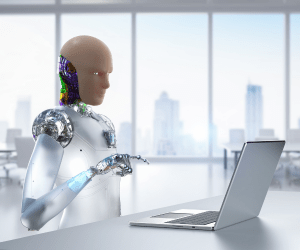The Rise of AI in Legal Practice
The future of law is not just about adopting AI; it’s about integrating AI as a tool while maintaining our humanity. Picture this, lawyers once buried under towering stacks of paperwork, frantically flipping through documents and burning the midnight oil to meet deadlines. Now, enter AI, the new superhero in the legal profession, revolutionising how lawyers engage with their work. These AI-powered tools have stepped in to save the day, automating the monotonous tasks that used to consume endless hours. Document review, contract analysis, legal research—you name it, AI can do it faster and more efficiently.
However, let’s be clear. AI isn’t here to replace lawyers. Instead, it’s like having a highly efficient assistant who handles the grunt work, leaving lawyers free to focus on what truly matters—communicating with clients. By offloading these time-consuming tasks to AI, lawyers can build stronger relationships and offer more personalised legal advice. The rise of AI has paved the way for a more human-centred approach to legal practice, where lawyers can dedicate their time to core legal tasks and client interactions.
Human Connection in Legal Practice
Around the world everyone is talking up AI. Let’s face it, no amount of AI wizardry can replace the warmth and understanding of a human connection. When clients are facing complex legal issues, they need more than just efficient service; they need empathy, trust, and understanding. AI might be great at crunching numbers, analysing data and producing robotic and repetitive content, but it falls short when it comes to emotional intelligence and active listening.
Building trust and understanding is crucial for effective legal representation. Research shows that clients are more likely to open up and share vital information with lawyers they trust. This trust is built through genuine human interactions, where empathy and active listening play key roles. As we integrate AI into legal practice, the value of these human skills will only grow. The future of law isn’t just about leveraging technology; it’s about combining AI with humanistic values to create a more compassionate and effective legal practice.
Balancing Efficiency with Empathy
So, how do we strike the perfect balance between AI efficiency and human empathy? The answer lies in leveraging AI to handle routine tasks while maintaining the personal touch that clients crave. AI can manage the heavy lifting of research and document management, freeing up lawyers to focus on building strong, trust-based relationships with their clients.
Clients want to feel valued and understood, and that’s where the human touch comes in. By using AI to streamline routine tasks, lawyers can devote more time to understanding their clients’ unique situations and providing tailored advice. This balance ensures that clients receive both top-notch legal service and the emotional support they need throughout their legal journey which at times can be demanding and quite stressful.
Ethical Judgement
It’s a given in the legal profession that ethical judgement is paramount. Lawyers have a professional duty to uphold justice, maintain client confidentiality, and provide competent representation. While AI can enhance productivity by automating tasks, it cannot replace the complex decision-making and ethical considerations that lawyers must navigate daily.
Integrating AI thoughtfully into legal practice is essential. Lawyers must ensure that their use of AI aligns with their ethical obligations, preserving the human oversight required to meet their professional responsibilities. By doing so, they can enhance efficiency while maintaining the integrity and ethical standards of the legal profession.
Client Relationships in the Digital Age
Undoubtedly we are living in a digital age, where AI technology is becoming ubiquitous, maintaining strong client relationships is more important than ever. As a lawyer, you are not just providing a service; you are building a brand. Self-awareness and the ability to connect with clients on a personal level set you apart from AI systems.
Your ability to empathise and understand your clients’ unique situations fosters deeper conversations and builds trust. Unlike AI, which lacks the capacity for personal connection, you can offer a level of emotional support and understanding that is invaluable. This trust not only enhances your professional effectiveness but also validates the irreplaceable human element in legal practice.
The Next Game Changer for Law Firms
The future of law is not just about adopting AI; it’s about integrating AI as a tool while maintaining our humanity. Combining the efficiency of AI with humanistic values, empathy, and emotional intelligence will be the next game changer for law firms. By doing so, we can create a legal practice that is both highly efficient and deeply human.
It is undeniable that we are now living in an AI-driven world, maintaining our humanity isn’t just possible—it’s essential. Embrace the technology, but never lose sight of the human touch that makes legal practice truly impactful. After all, it’s the combination of AI’s efficiency and human empathy that will define the future of law. So, let’s gear up for a future where technology and humanity go hand in hand, creating a legal practice that’s not just smarter, but also kinder and more compassionate.



